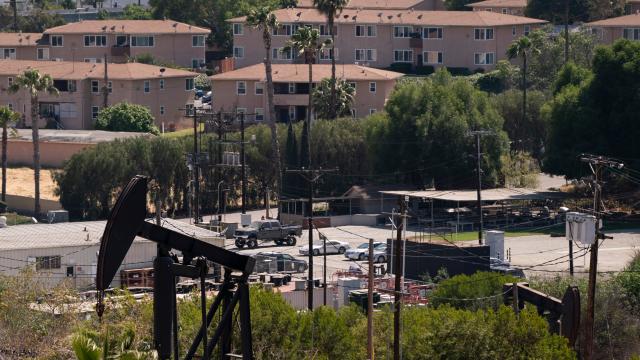The Los Angeles City Council opted to end oil and gas drilling within the city’s limits in a historic Friday vote. The decision was unanimous, with 12-0 in favour of a draft ordinance phasing out existing fossil fuel wells and banning new ones. LA will end all of its current oil and gas drilling within the next 20 years, and no new in-city extraction operations will be approved.
“When this ordinance goes into place, there will be no new oil and gas production whatsoever,” council member Paul Krekorian said during the council meeting, according to a report from Scientific American. “That’s a pretty monumental step that we’re taking.”
And your reaction to this news was, “There are oil wells in LA?”, you’ll be shocked to learn that Los Angeles is the largest urban oil field in the country. The city has 26 distinct oil and gas fields and more than 5,000 oil and gas wells, according to the city planning department.
Los Angeles was founded as an oil town. By 1930, California was producing about one quarter of the world’s total oil, in large part because of the contributions of the LA region. And that history has continued on, through the ubiquitous presence of both active and inactive wells.
Many of those wells are sequestered in industrial areas like Wilmington and Harbour Gateway, but rigs also operate in residential and commercial areas, where people live and are exposed to the resulting pollution. There are oil wells in Downtown, West LA, South LA, and in the Northwest San Fernando Valley, the planning department noted. More than 3.7 million LA residents live within a quarter-mile of an active or idle well, according to STAND-LA, the grassroots environmental justice coalition that led the initiative to ban drilling within the city.
Fossil fuel wells emit carcinogenic toxins like benzene, hydrogen sulfide, and formaldehyde, even (and sometimes especially) when they’ve been abandoned and left inactive. Health research has demonstrated that living near oil and gas development can increase the risk of certain types of cancer, lung problems like asthma, pre-term birth, and other issues associated with air pollution.
Industrial air pollution disproportionately burdens communities of colour, and oil and gas extraction in LA is no exception. For decades, these fossil fuel operations in Los Angeles have existed in closest proximity to predominately Black communities, because of purposeful zoning decisions and city policies. “This ordinance will amend decades of racist land use decisions that concentrated oil drilling in Black and Brown communities,” wrote STAND-LA in a press release celebrating the council vote.
Earlier this year, California’s state legislature voted to ban new oil wells near sensitive locations like neighbourhoods, schools, and parks, and this new LA council decision is an even more sweeping action that takes the city and state closer to previously stated long-term climate goals like carbon neutrality.
Not every fossil fuel company operating in LA will have a full two decades to stop extraction. The city says it will soon begin a study assessing how much time each oil or gas well would need to recoup its initial investment costs. Depending on the outcomes of that assessment, the city council may require companies to shut down on a shorter timeline (i.e., when they’ve earned back their capital costs).
In response to the pending legislation, the California Independent Petroleum Association, an industry group, sent a letter to city officials in October contesting the scientifically proven air quality and health impacts of fossil fuel extraction. Counterintuitively, the letter also claimed that ceasing drilling in LA would lead to more foreign oil imports, which the trade association said could worsen air quality along the coast and near points of import. Further, CIPA pointed to one estimate claiming the fossil fuel industry brings in $US250 ($347) million to the city’s general funds.
James Watt, CEO of Warren, one of the companies operating drill rigs in LA, said his company would use “all available legal resources” to respond to the new rules — indicating a possible lawsuit in an interview with the Los Angeles Times. Watt also dubiously claimed pollution from Warren’s drilling was on “par with that of a fast-food restaurant.” Even if that were true, air pollution from eateries is nothing to scoff at.
